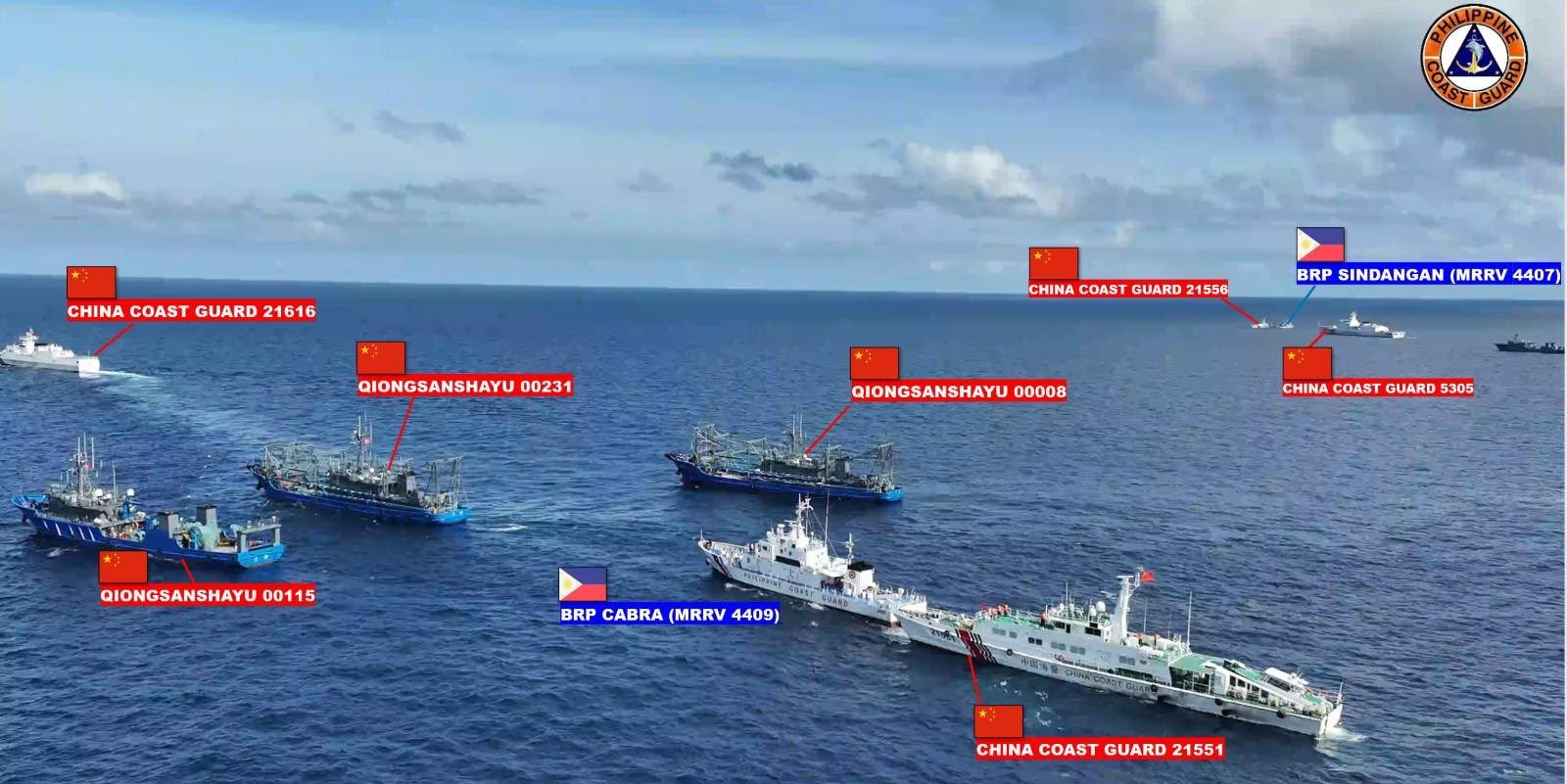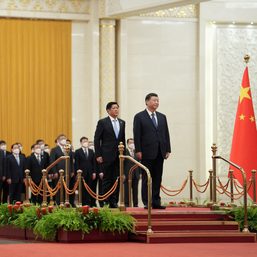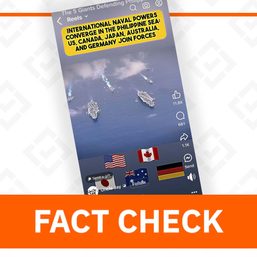SUMMARY
This is AI generated summarization, which may have errors. For context, always refer to the full article.

MANILA, Philippines – US President Joe Biden on Thursday, October 26 (Wednesday, October 25 in Washington DC), reiterated his country’s “ironclad” defense commitment to Manila days after China’s “dangerous maneuvers” led to collisions with Philippine vessels in the West Philippine Sea.
“Just this past week, the PRC vessels acted dangerously and unlawfully as our Philippine friends conducted a routine resupply mission within their own – their own exclusive economic zone in the South China Sea. I want to be clear – I want to be very clear: The United States’ defense commitment to the Philippines is ironclad,” Biden said in a joint press briefing with Australian Prime Minister Anthony Albanese in Washington DC.
A transcript of the briefing was uploaded by the White House.
“Any attack on the Filipino aircraft, vessels, or armed forces will invoke…our Mutual Defense Treaty (MDT) with the Philippines,” he said, referring to the agreement signed between Manila and Washington DC in 1951. Under its terms, both countries promise to come to each others’ help in the event of an external attack.
The US is the Philippines’ treaty-ally while ties with Australia have recently been upgraded to a strategic partnership.
“Australia and the United States also share, in my view, the commitment to upholding the international rules of the road, including freedom of navigation,” noted Biden in the press conference.
On October 22, during a routine resupply mission to the BRP Sierra Madre in Ayungin Shoal, Chinese and Philippine boats collided at sea. The Philippines said it was due to China’s “dangerous manuevers” in the open sea – a tactic that Manila has called out in every supply mission.
Dangerous maneuvers refer to several actions, including Chinese ships shadowing and blocking Philippine vessels. Video and stills from Manila show numerous Chinese vessels – from the China Coast Guard and its Chinese Maritime Militia – surrounding the four Philippine Coast Guard (PCG) and military-contracted small wooden boats out at sea.
Two ships – the PCG’s BRP Cabra and the Armed Forces of the Philippines-hired Unaiza May 2 – were damaged as a result of the collisions. The resupply was also deemed a partial success since the Unaiza May 2 was unable to reach the BRP Sierra Madre because Chinese vessels continued to hound it on its way to Ayungin Shoal (Second Thomas Shoal).
The BRP Sierra Madre is a Philippine Navy ship that was intentionally run aground in Ayungin Shoal in 1999. It now serves as the Philippines’ outpost in the shoal.
In their joint statement, Biden and Albanese reiterated the US’ and Australia’s support for rule of law and their opposition to China’s “destablizing actions” in the South China Sea.
They said they opposed “destabilizing actions in the South China Sea, such as unsafe encounters at sea and in the air, the militarization of disputed features, the dangerous use of coast guard vessels and maritime militia, including to interfere with routine Philippines maritime operations around Second Thomas Shoal, and efforts to disrupt other countries’ offshore resource exploitation.”
The leaders also reiterated their stand that the 2016 South China Sea Arbitral Award, which invalidated China’s sweeping claim over practically all of the South China Sea, is “final and legally binding on the parties in that proceeding.”
“We are concerned about China’s excessive maritime claims that are inconsistent with international law, as well as unilateral actions that may raise tensions and increase the risk of miscalculation in the region. We resolve to work with partners to support regional maritime security and uphold international law,” said Biden and Albanese.
Under the 2016 arbitral award, China’s “land reclamation and construction of artificial islands, installations, and structures has caused severe, irreparable harm to the coral reef ecosystem” in the Spratly Islands, where Ayungin Shoal is found.
Biden and Albanese’s statements follow earlier statements made by their governments and embassies in Manila in relation to China’s acts of aggression in the South China Sea.
US legislators had also condemned the China Coast Guard’s “unlawful actions” against the Philippines.
“We condemn Beijing’s maritime intimidation and welcome the Biden administration’s announcement to increase joint patrols with the Philippines and other partners in the South China Sea and its reaffirmation to uphold its commitment under the US-Philippines Mutual Defense Treaty,” said ranking members of the US House foreign affairs committee and subcommittee on the Indo-Pacific.
Under President Ferdinand Marcos Jr., ties between the Philippines and the US began to thaw again, after his predecessor, Rodrigo Duterte embarked on what he called an “independent foreign policy” that sought to veer away from the country’s traditional ally, the US, and instead pivoted to China – a move that failed to pay off, as Chinese incursions in the West Philippine Sea continued under Duterte’s watch.
During a state visit to Beijing in January, Marcos and Chinese President Xi Jinping said they looked forward to a “new golden age” in bilateral ties. Weeks later, the Philippine government announced that more military bases had been identified as sites under the Enhanced Defense Cooperation Agreement (EDCA), where US would be able to rotate troops and build infrastructure and military storage facilities.
During Marcos’ visit to Washington DC in May, the Philippines and the US also agreed on new guidelines to cover the MDT, including assurance that it could be invoked in event of a South China Sea attack. – Rappler.com
Add a comment
How does this make you feel?




![[Rappler’s Best] Knowing when to leave](https://www.rappler.com/tachyon/2024/07/biden-sara-gfx.jpg?resize=257%2C257&crop_strategy=attention)













![[Just Saying] SONA 2024: Some disturbing points](https://www.rappler.com/tachyon/2024/07/TL-marcos-sona-points-july-23-2024.jpg?resize=257%2C257&crop=335px%2C0px%2C720px%2C720px)

There are no comments yet. Add your comment to start the conversation.